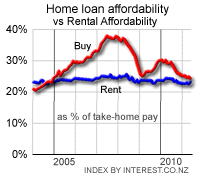 By Bernard Hickey Interest.co.nz's Rent or Buy Report for April shows it was marginally cheaper to buy than to rent a similar property in April, but the advantage seen for buying over renting has narrowed in the last 3 months to virtually nothing. Higher interest rates and a slight rise in house prices in March and April have started to turn around a one year trend which saw the prospect of buying improving versus renting because of the fall in interest rates in 2008 and the 10% fall in house prices. It now costs 23.0% of the median household take-home pay to service an 80% mortgage on a lower quartile house, whereas it takes 23.1% of median household take-home pay to rent a median 3 bedroom home. Rents have been basically stable at around NZ$310 since early 2007.
By Bernard Hickey Interest.co.nz's Rent or Buy Report for April shows it was marginally cheaper to buy than to rent a similar property in April, but the advantage seen for buying over renting has narrowed in the last 3 months to virtually nothing. Higher interest rates and a slight rise in house prices in March and April have started to turn around a one year trend which saw the prospect of buying improving versus renting because of the fall in interest rates in 2008 and the 10% fall in house prices. It now costs 23.0% of the median household take-home pay to service an 80% mortgage on a lower quartile house, whereas it takes 23.1% of median household take-home pay to rent a median 3 bedroom home. Rents have been basically stable at around NZ$310 since early 2007.
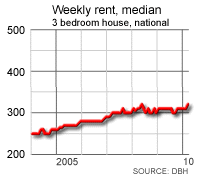 Through 2007 and most of 2008 it was significantly cheaper to rent than buy because of high house prices and high interest rates. However, that gap narrowed from being around 10% more expensive to buy than to rent in late 2007 to being around 3% more expensive to rent than to buy in February 2009. The first quartile house price has dropped from over NZ$250,000 at the end of 2007 to around NZ$240,000 by late 2008, but has nudged up in March and April. Also, the 2 year fixed mortgage rate crashed from over 9.5% in February 2007 to just under 6% in January, but has since bounced to around 6.2%. What I think
Through 2007 and most of 2008 it was significantly cheaper to rent than buy because of high house prices and high interest rates. However, that gap narrowed from being around 10% more expensive to buy than to rent in late 2007 to being around 3% more expensive to rent than to buy in February 2009. The first quartile house price has dropped from over NZ$250,000 at the end of 2007 to around NZ$240,000 by late 2008, but has nudged up in March and April. Also, the 2 year fixed mortgage rate crashed from over 9.5% in February 2007 to just under 6% in January, but has since bounced to around 6.2%. What I think 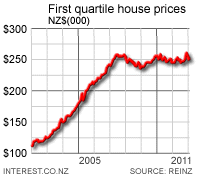 The improvement in the buy versus rent equation through late 2008 and into January and February 2009 helps explain why first home buyers returned to the market in March and April. The question now is will the first home buyers keep returning as the equation moves against them again as interest rates rise and house prices stop falling. It's worth looking at all the assumptions in this Rent or Buy Report produced by Interest.co.nz, which we launched only last month. It includes specific reports for each region. It is essentially the same data used in our Home Loan Affordability report with addition of a comparison with rentals, which we also monitor.
The improvement in the buy versus rent equation through late 2008 and into January and February 2009 helps explain why first home buyers returned to the market in March and April. The question now is will the first home buyers keep returning as the equation moves against them again as interest rates rise and house prices stop falling. It's worth looking at all the assumptions in this Rent or Buy Report produced by Interest.co.nz, which we launched only last month. It includes specific reports for each region. It is essentially the same data used in our Home Loan Affordability report with addition of a comparison with rentals, which we also monitor. 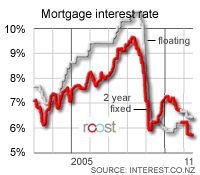 The key assumptions are that the buying option does not include any assumptions about maintenance or rates costs, which are usually significant. We also make the assumption that a young family in a 3 bedroom rental would look to buy a 'cheap' house, which we've judged to be the first quartile priced house. The big caveats with this study are that it uses the most current interest rates and is for a household with two median incomes. I'd caution any first home buyer to be careful not to overcommit and to assume that interest rates will not stay down at 6% forever. The long term average is around 8% and any purchasing decision should take this into account. It's also worth assuming, I think, that house prices are likely to stay low or even fall further in the next couple of years. Also take into account the likely cost of rates and maintenance. Once these costs and average 8% interest rate is taken into account, it is still more expensive to buy than rent.
The key assumptions are that the buying option does not include any assumptions about maintenance or rates costs, which are usually significant. We also make the assumption that a young family in a 3 bedroom rental would look to buy a 'cheap' house, which we've judged to be the first quartile priced house. The big caveats with this study are that it uses the most current interest rates and is for a household with two median incomes. I'd caution any first home buyer to be careful not to overcommit and to assume that interest rates will not stay down at 6% forever. The long term average is around 8% and any purchasing decision should take this into account. It's also worth assuming, I think, that house prices are likely to stay low or even fall further in the next couple of years. Also take into account the likely cost of rates and maintenance. Once these costs and average 8% interest rate is taken into account, it is still more expensive to buy than rent. 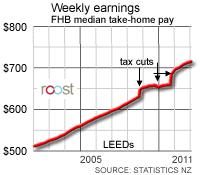 Also be wary about assuming your income will be solid and rising in coming years. Unemployment is rising and may hit 10% by the end of next year. All it takes is a period of unemployment and/or a loss of one income for family reasons to make the equation look very ugly. I'd also suggest demanding a big price cut when buying a house, with a discount of at least 20% from the peak price in 2007, which is likely to be the asking price now. Your view? Comments are welcomed below.
Also be wary about assuming your income will be solid and rising in coming years. Unemployment is rising and may hit 10% by the end of next year. All it takes is a period of unemployment and/or a loss of one income for family reasons to make the equation look very ugly. I'd also suggest demanding a big price cut when buying a house, with a discount of at least 20% from the peak price in 2007, which is likely to be the asking price now. Your view? Comments are welcomed below.

We welcome your comments below. If you are not already registered, please register to comment
Remember we welcome robust, respectful and insightful debate. We don't welcome abusive or defamatory comments and will de-register those repeatedly making such comments. Our current comment policy is here.